I am looking to see how a function that computes the Hessian of a log-likelihood can be compiled, so that it can be efficiently used with different sets of parameters.
Here is an example.
Suppose we have a function that computes the log-likelihood of a logit model, where y is vector and x is a matrix. beta is a vector of parameters.
pLike[y_, x_, beta_] :=
Module[
{xbeta, logDen},
xbeta = x.beta;
logDen = Log[1.0 + Exp[xbeta]];
Total[y*xbeta - logDen]
]
Given the following data, we can use it as follows
In[1]:= beta = {0.5, -1.0, 1.0};
In[2]:= xmat =
Table[Flatten[{1,
RandomVariate[NormalDistribution[0.0, 1.0], {2}]}], {500}];
In[3]:= xbeta = xmat.beta;
In[4]:= prob = Exp[xbeta]/(1.0 + Exp[xbeta]);
In[5]:= y = Map[RandomVariate[BernoulliDistribution[#]] &, prob] ;
In[6]:= Tally[y]
Out[6]= {{1, 313}, {0, 187}}
In[9]:= pLike[y, xmat, beta]
Out[9]= -272.721
We can write its hessian as follows
hessian[y_, x_, z_] :=
Module[{},
D[pLike[y, x, z], {z, 2}]
]
In[10]:= z = {z1, z2, z3}
Out[10]= {z1, z2, z3}
In[11]:= AbsoluteTiming[hess = hessian[y, xmat, z];]
Out[11]= {0.1248040, Null}
In[12]:= AbsoluteTiming[
Table[hess /. {z1 -> 0.0, z2 -> -0.5, z3 -> 0.8}, {100}];]
Out[12]= {14.3524600, Null}
For efficiency reasons, I can compile the original likelihood function as follows
pLikeC = Compile[{{y, _Real, 1}, {x, _Real, 2}, {beta, _Real, 1}},
Module[
{xbeta, logDen},
xbeta = x.beta;
logDen = Log[1.0 + Exp[xbeta]];
Total[y*xbeta - logDen]
],
CompilationTarget -> "C", Parallelization -> True,
RuntimeAttributes -> {Listable}
];
which yields the same answer as pLike
In[10]:= pLikeC[y, xmat, beta]
Out[10]= -272.721
I am looking for an easy way to obtain similarly, a compiled version of the hessian function, given my interest in evaluating it many times.


